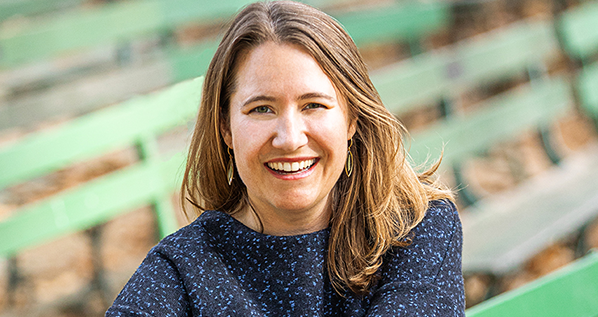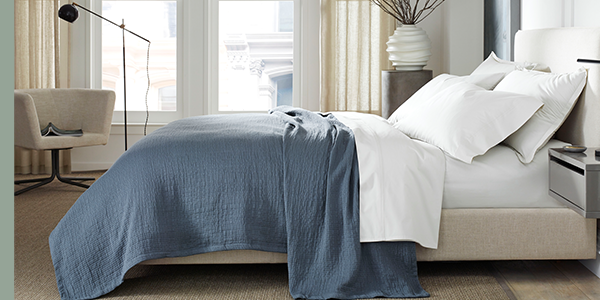We sat down with Friday Apaliski, a Sustainability Concierge who has made it her mission to guide people on their journeys to sustainable homes.
Ten years ago, Friday Apaliski got up in front of her advertising colleagues, put on a pair of gloves, and started going through the trash. The goal was to teach them about recycling and composting. When she was done, she offhandedly said to a friend, “I would leave this job in a heartbeat if I could do that for my job.” Next thing she knew she was working for the San Francisco Department of the Environment. Following six years of learning everything she could from policymakers and scientists, she broke out on her own and launched a business, dubbing herself the Sustainability Concierge. Here, Friday tells Under the Canopy what that means and why it’s time to ditch the paper towels, change those incandescent lightbulbs, and switch to sustainable alternatives (may we recommend our already eco-friendly, 100% organic towels and GOTS certified sheets?!).

So what, exactly, do you do?
I go into people's homes and say, “This is what sustainability looks like for you.” My job is to understand you and your family and figure out what the nuance is for you to be the best that you can be. And it’s different in every household. Some people have access to things that others don’t. There are certain programs that work in some homes and don't work in others. There are a million different variations.

Take us through your process.
First, I spend about two hours truly looking at everything from your HVAC system to your dental floss. I ask to see your electricity or utility bills, and then we walk through your whole house together and I take pictures while asking questions about how and why you use certain things. Like, if I find plastic food storage, I ask how you use it. I’m not saying, “This is good” or “This is bad.” These questions are just trying to get at what you like about the things you use; your value system. Like, what are the things that you need and where are you willing to be flexible? And where are you totally not willing to be flexible because everybody has those, too. Nobody's perfect. It's all good!
What happens next?
I spend about two weeks looking through everything I documented and put together a big, beautiful report. I go through your heating system and why it's important to go electric; what that means for you and how to do it. I go through water consumption; where you’re wasting water. I look at toxin prevention—from couch cushions and carpet padding to dental floss and face wash. I give things a rating and include links to specific solutions. Then, we go over it and I answer any questions before allowing you to implement it all by yourself.
Do they?
Most of my clients, at the end, say, “Wow, this is a lot of information. Can you do it for me?” And I do. I haven’t had a single client who didn't become an evangelist [with my help]. Because when you do it right, and you're not giving up style and you're not giving up convenience, everybody wants to be on board. Everybody wants to talk about how good that feels, personally, and how good that feels to be part of a movement.
What are the three easiest things someone could do in their home right now to be more sustainable?
Lightbulbs! It's a one-time thing that has a big impact. Incandescent lights heat your house. But LED lights don't get hot so they don't heat up your space. They also use 85% less electricity than an incandescent lightbulb so just like that you're saving money. One LED bulb is going to last you 10 years!
Get rid of disposable stuff like paper towels. Just totally ditch them! Replace them with reusable cloths. Textiles, in general, should never be thrown away. They're such a valuable resource. Old sheets, towels, and clothing can be used for so many other purposes. An old T-shirt can turn into a rag. Even your old duvet cover can be cut up and used in another way.
Buy in bulk and store in glass. You can't avoid plastic packaging in cereal and chips. It’s an unfortunate truth. Sure, you can try very hard not to eat those things, but we're human beings and sometimes we need comfort food. So if you put them in a sealable jar, they’ll last forever. In general, when you buy something, store it in a way that will keep it fresh for longer to reduce food waste.
Any last words of wisdom?
Don’t just be more conscious about what you’re buying, but also be vocal about it. Maybe you think a certain yogurt is the best yogurt in the world and you don't want to live without it, but you hate that it comes in a plastic package. Write to them and say, “I am a big consumer. I really love your product. But I would love it even more if it came in a glass container.” Then, write to your political representative and say, “Boy, I really wish you would mandate that all companies use reusable containers and not disposable containers.” We do the best we can by voting with our voice and our dollars. That matters every single day. I know the guilt of it all is real. Get rid of that by focusing on being better and doing what you are able to.
FRIDAY'S WISHLIST
Under the Canopy products that are better for you – and the planet.

"Nice and light-weight to keep you warm and cozy on the couch, without having to turn up the heat."

"Towels are a good item to spend a little extra money on for good quality. You use them every day, and they will last you years."

"I'm a sucker for cozy pants. Plus, these have pockets! And they're organic, which is so hard to find. Also, because they are tapered, you can even wear them on your bike to make a quick errand."

"Swaddles are the most useful for any new parent. Plus, they not only swaddle the baby, but also catch spit up, cover a nursing mother, can act as a sheet for a changing table, and even be turned into a picnic blanket at the park once the baby grows!"
SHOP CONSCIOUSLY WITH UNDER THE CANOPY
